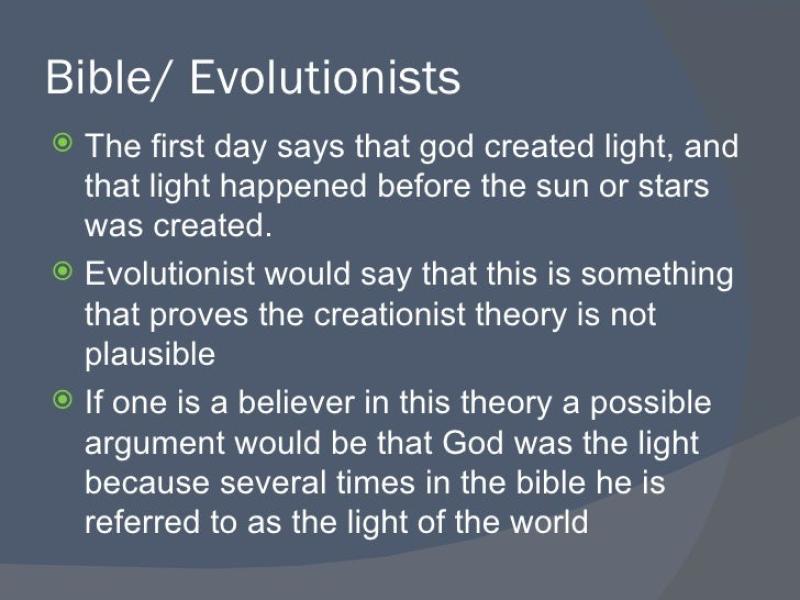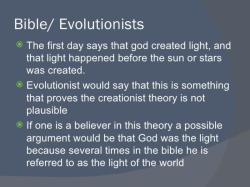How much evidence is there to support the creationist theory?
The support for creationism primarily comes from religious texts and beliefs rather than empirical scientific evidence. Creationism posits that life and the universe were created by a divine entity or a supernatural force.
In the scientific community, creationism is not considered a scientific theory because it doesn't adhere to the scientific method. Scientific theories are based on empirical evidence, testable hypotheses, and predictive capabilities.
Creationism, often associated with religious beliefs, is not supported by the same type of empirical evidence that scientific theories, such as evolution through natural selection or the Big Bang theory, are built upon. Instead, creationism relies on interpretations of religious texts like the Bible, which are not subject to empirical testing or verification in the same way as scientific theories.
Scientific evidence overwhelmingly supports concepts like the theory of evolution, which explains the diversity of life through natural selection and genetic changes over time, and the Big Bang theory, which describes the early development of the universe.
While creationist beliefs are held by many individuals and groups, they are considered a matter of faith rather than scientifically testable claims. As such, the level of evidence supporting creationism, from a scientific standpoint, is not measured or evaluated in the same way as evidence supporting empirical scientific theories.
What evidence exists to support the theory of creationism?
The theory of creationism, particularly young-earth creationism, faces significant challenges from established scientific fields like biology, geology, and cosmology. Most scientists agree that these fields provide overwhelming evidence for an ancient Earth and the evolution of life over billions of years.
However, proponents of creationism offer various arguments in support of their beliefs. These arguments can be broadly categorized as follows:
1. Arguments based on the Bible:
- Biblical inerrancy: Young-earth creationists believe that the Bible is the literal word of God and therefore inerrant in its pronouncements. They interpret the Genesis creation account as describing a literal six-day creation event around 6,000-10,000 years ago.
- Design complexity: Creationists argue that the complexity of life and the universe point to an intelligent designer. They see this complexity as evidence against the idea that life arose through random processes like evolution.
2. Arguments based on natural science:
- Irreducible complexity: This argument suggests that certain biological systems are so complex that they cannot have evolved gradually through natural selection. However, scientists have proposed plausible evolutionary pathways for many supposedly "irreducibly complex" systems.
- The Cambrian explosion: The sudden appearance of diverse animal life in the fossil record during the Cambrian period is sometimes cited as evidence against evolution. However, scientists have proposed various explanations for this phenomenon, including improved fossilization and the gradual diversification of life forms prior to the Cambrian.
- Fine-tuning argument: This argument posits that the universe is "fine-tuned" for life, with physical constants and initial conditions seemingly designed for the existence of complex life. However, this argument relies on anthropic reasoning and fails to explain why the universe appears fine-tuned specifically for human life.
3. Arguments based on scientific limitations:
- Gaps in the fossil record: Creationists often point to gaps in the fossil record as evidence against evolution. However, the fossil record is incomplete by nature, and new discoveries are constantly filling these gaps.
- Radiometric dating methods: Creationists claim that radiometric dating methods are unreliable and cannot accurately date the Earth or fossils. However, these methods are well-established and have been extensively tested and validated by scientists.
- Origin of life: The origin of life remains a scientific mystery. However, this lack of complete understanding does not constitute evidence against evolution or in favor of creationism.
It is important to note that these arguments are often disputed by scientists and have been addressed in detail by the scientific community. Additionally, many of these arguments rely on misinterpretations of scientific data or flawed logic.
Therefore, while creationism offers various arguments for its beliefs, the evidence from established scientific fields overwhelmingly supports the theory of evolution and an ancient Earth.


